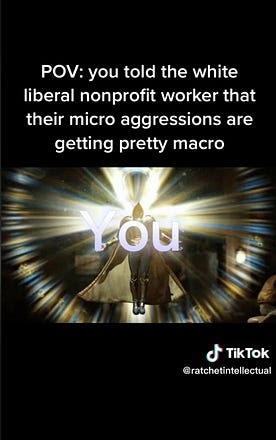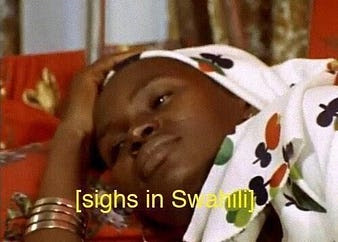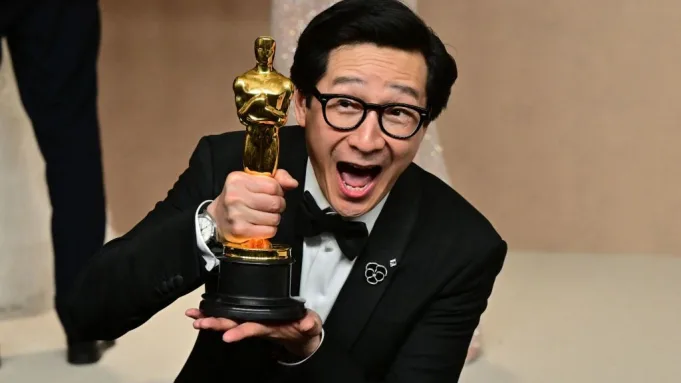 Top Sounds
Top Sounds 
Our curated picks of the top sounds on TikTok
- I Feel Bonita
 Do you feel pretty? No? Well, this sound is for when you reluctantly have to admit you do.
Do you feel pretty? No? Well, this sound is for when you reluctantly have to admit you do. - I’m Only Human
 This sound is for when you’re ready to accept blame and for calling out the people and organizations who absolutely are not.
This sound is for when you’re ready to accept blame and for calling out the people and organizations who absolutely are not. - Old Spice
 This is technically a whole category of sounds— Biden x Ice Spice (sometimes featuring Obama). The phrase “hypnotic flow that soothes my soul” has been repeating in my head all week. This sound is a reminder that AI is all over our social media trends now and that a funny enough iteration of a trending sound can easily become a trend in its own right.
This is technically a whole category of sounds— Biden x Ice Spice (sometimes featuring Obama). The phrase “hypnotic flow that soothes my soul” has been repeating in my head all week. This sound is a reminder that AI is all over our social media trends now and that a funny enough iteration of a trending sound can easily become a trend in its own right. - She’s Sweet But A Psycho
 For reasons I am not entirely clear on, grandmatok (featuring imagined stock-image grandmas, not actual grandmas) is a thing and this sound was used to reveal imaginary divorces and health updates.
For reasons I am not entirely clear on, grandmatok (featuring imagined stock-image grandmas, not actual grandmas) is a thing and this sound was used to reveal imaginary divorces and health updates. - Eat Your Young
 Hozier ate. Bad pun, I know. This sound has a stranglehold on the witchy, wlw, and cottage-core sides of TikTok. Personally, I can’t wait for the album.
Hozier ate. Bad pun, I know. This sound has a stranglehold on the witchy, wlw, and cottage-core sides of TikTok. Personally, I can’t wait for the album.
 Our Sound Highlight
Our Sound Highlight 
Too Much Labor
Mood: 
This song is the sound of Women’s History Month on TikTok. Some creators criticized the white feminist take on the trend by showing the unseen labor of BIPOC women throughout history.
 Effects Highlight
Effects Highlight 
Our curated picks of the top effects on TikTok

Folks are using the above CapCut filter to show their little work-day errands and other mundane activities.

Whether you had to distract yourself, your kids, or your dog, this filter is a funny way to share the story.

Use this filter to show responses that are so common they’re cliché.

Pair this CapCut filter with “I’m Only Human” in our sound highlight to call out those who refuse to take responsibility.
 The Moment
The Moment 
Issues that are at the forefront of online discourse— Mr. Beast
Mr. Beast made a name for himself as YouTube’s resident content philanthropist and, more recently, as a man who mobilized his fans to clean up Walmart shelves.
This past week Mr. Beast released a video entitled “Giving 20,000 shoes to kids in Africa.” In which he partnered with a South African charity to give shoes to children.
When it comes to making a social impact online, you could say I have some experience. And as an African, I have seen my fair share of white savior, voluntourist, philanthropy. As a result, the discourse around Mr. Beast was all too familiar.
In the popular Western imagination, Africa is seen less as a diverse continent and more as a homogenous mass with a propensity for poverty, where its wildlife is frequently more sympathetic than its people. When African people are the subject of Western media it is all too often as recipients of aid that might help but largely ignores the root causes of the problems represented.
Mr. Beast isn’t particularly different from the thousands who descend upon Africa with notions of building wells and schools. His white saviorism is offensive but all too common. The current round of discourse is a part of the criticism of philanthropy as a whole.
Mr. Beast often engages in this kind of philanthropy— philanthropy that is untethered to deeper advocacy, without a root in activism, mutual aid, or community action. Questioning his intentions is fair, after all this is a man who regularly engages in problematic charitable schemes, but is largely uninteresting to me.
I am more concerned about what this form of content-philanthropy does for those who want to make an impact. I am especially concerned about other influencers using this model to engage in social issues, rather than partnering with communities well-versed in their own challenges, and trying to effect deeper change.

 The Zeitgeist
The Zeitgeist 
Hot topics from across the internet
- An anonymous actor let the world know Academy voters can be just as prejudiced as you might expect in an Entertainment Weekly article.
- Everything Everywhere All At Once swept the Academy Awards, taking home 7 Oscars. Deserved!
- Reels are coming to Facebook because every social media site really needs to switch to short-form video.
- Eli Lilly will be capping insulin prices and while this prank tweet might have been a part of this story, so were years of relentless advocacy.
- Workers are petitioning against return to the office policies and good for them!
- Side-bar: if you’re currently hiring please re-consider the language on your job listings. I promise you, no one wants to be a rockstar or a hustler or whatever other nouns you use to describe being overworked.
- Hugh Grant and Ashley Graham had a horrifically awkward interview on the ‘champagne carpet’ at the Oscars. I think I’m on Hugh’s side here folks, that was a perfectly solid Thackeray reference.
 The Takeaway
The Takeaway 
TikTok is receiving backlash for recent changes to the algorithm and the effects of ‘heating’ (and we can only assume ‘cooling’) on BIPOC creators. Creators like @nimay.ndolo called out a pattern of underperformance of BIPOC creators on TikTok compared to Reels and Shorts, in spite of audience support.
Equity on TikTok has been in the discourse for a hot minute, with creators asking “Where is the Black Alix Earle?” and reckoning with the disparity in partnerships, views, and public recognition between Black and white creators who produce similar content.
It’s no secret that TikTok has a hand in the success of certain videos. Somewhere in TikTok HQ decisions are made about what to promote and who to suppress. Unsurprisingly, this has a detrimental impact on marginalized people just trying to make content and a sustainable career in the industry. TikTok has a nasty habit of suppressing the voices of those who are most affected by online hate and harassment. Take a look at @samyra calling out the hate she has received for [checks notes] existing while Black and fat. TikTok made the decision to punish the Black creator for calling out those who had harassed her, by putting her content under review, rather than dealing with the harassers themselves.
TikTok has a problem on its hands. One entirely of its own making. Black creators have been the root of numerous trends on the app. Without Black creators innovating and creating, there would be no Charli D’Amelio, no viral hair-oil video for Alix Earle. The more TikTok suppresses content from BIPOC creators, the more creators will learn to spend their time and creative energy elsewhere.
Like Vocal Verified? Share it with a friend!



